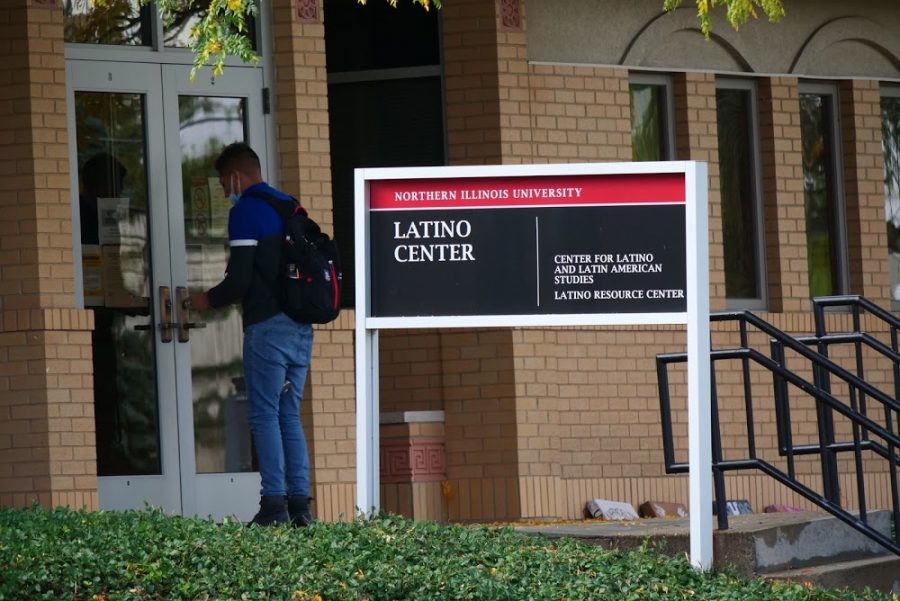How Latino students celebrated Latino Heritage Month in September
De Mujer a Mujer meets Wednesdays at the Latino and Latin Studies Resource Center.
October 5, 2020
DeKALB – September was Latino Heritage month and, while COVID-19 rendered gatherings by the Latino Resource Center impossible, that didn’t stop NIU students from recognizing and taking pride in their Latino heritage.
“Celebrating Latino heritage means celebrating Latino culture and learning what it’s all about,” Luis Santos-Rivas, director of the Latino Resource Center, said.
Part of Latino Heritage month is exploring one’s roots and discovering the culture, literature, music, food, dance and folklore of their heritage.
NIU is home to several Latino students who, over the past month, have developed a stronger connection with their heritage. Among them is Edgar Lopez, a graduate assistant at the Latino Resource Center, who spent September educating himself on Latinos who changed society for the better and further exploring his Mexican heritage, Lopez said.
“I’m proud of my heritage or how we say ‘soy orgulloso de ser Mexicano,’” Lopez said. “I embrace my ability to fluently speak two languages — Spanish and English. Being bilingual has opened many doors for me.”
Another way students connected to their culture was to look back on those who came before them in their family, like Isis Hernandez, a graduate assistant of Mexican descent. Hernandez said spending time with family and learning about their past as a great way to keep in touch with her roots.
“There’s a misconception that, in Latino culture, everything has to be Mexican,” Santos-Rivas, originally from the Dominican Republic, said. “[At NIU] we have students from Colombia, Venezuela and El Salvador.”
Learning about Latino culture also means discovering the differences between the cultures of Latino countries because being Latino doesn’t mean being one thing.
“There’s an intersectionality to Latino Culture and elements of it bleed into other cultures,” Santos-Rivas said. “The tango came from Argentina and Mariachi came from Brazil.”
Due to COVID-19, the Latino Resource Center hasn’t been able to host any in-person events.
Normally, during September, the Latino Resource Center hosts an event called Latin Chill to celebrate Latino students on campus during Latino Heritage Month. However, the 2020 Latin Chill, originally scheduled for Sept. 16, had to be cancelled due to the social distancing requirements put in place by the university, Santos-Rivas said.
Latino students, as a minority, often face challenges other students don’t, Lopez said. For students, there are ways to respect and appreciate the heritage of Latino students all year long. One of the biggest resources to do so is the Latino Resource Center which gives Latino students ways to make their social and academic experiences at NIU worthwhile.
The Latino Resource Center hosts several events for Latino students, especially during September to honor Latino Heritage Month, including a special graduation ceremony for Latino students. However, the spring graduation ceremony had to be done virtually since the in-person ceremony was cancelled and all events for the fall semester are either cancelled or will be done virtually, Santos-Rivas said.
NIU’s Latino Resource Center offers numerous resources for Latino students including a computer lab, study lounges and wireless internet, according to the center’s website. However, due to COVID-19, hours of operation have been reduced to noon to 4 p.m. Monday, 8 a.m. to noonTuesday and 10 a.m. to 3 p.m. Wednesday. The center is also open on Thursday and Fridayby appointment only.
Other programs available are the mentorship program, which assigns a mentor to freshman and transfer students.The Latino Honor Society as well, which encourages students with a 3.0 GPA to engage in the three pillars of Leadership, Community Service and Mentoring.
Non-Latino students also have a part to play in recognizing Latino students and that is through the acknowledgement and understanding of Latino culture, Lopez said.
“Educate yourself,” Lopez said. “Latinos are predicted to be the largest minority in the U.S, [so] how can everyone work together to overcome challenges and increase equity.”



